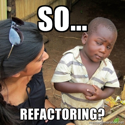Months ago, I wrote a post on some of my preferred HTML Code Styles during which I shared two specific things that I do whenever I am writing markup.
Specifically, I do the following things:
- Comment Terminating Tags
- Underscore Class Names
When it comes to writing code, there are always going to be standards – well, at least there should be – that depend on the proverbial sandbox in which we’re playing.
These standards will outline certain things that we should do, but there are always bound to be gray areas. Case in point: I know people have often commented (no pun intended) that they aren’t a fan of the way that I terminate certain closing blocks with comments such as `// end if` or `// end while` or `// end class`.
Which is completely fine – to me, that’s an example of a gray area that gives us, as developers, room for implementing our own unique styles. But then there are others that really should be reconsidered.
And that’s what I’ve had to do with some of my markup styles.






